牛津沪教版英语八年级下 Unit1-Unit2语法知识点整合
- 格式:doc
- 大小:51.00 KB
- 文档页数:11
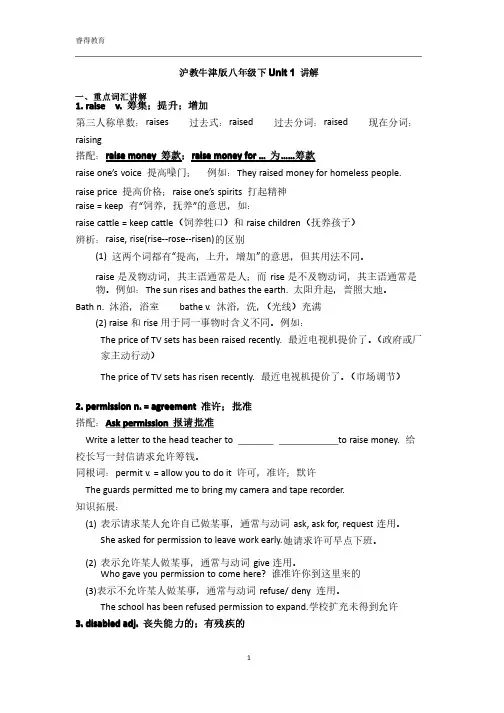
搭配:raise money筹款;raise money for…为……筹款搭配:Ask permission报请批准toI taught disabled children to sing.我教残疾的孩子唱歌。
同根词:disable v.=make(sb.)unable to do sth.使残废,使伤残He is disabled from vo ng.他失去了选举资格。
enable v.[ɪn'eɪb(ə)l]=make(sb.)able to do sth.使(某人)能够做某事The new test should enable doctors to detect the disease early.新的检测手段应该能够使医生们尽早查出这种疾病。
搭配:mentally disabled有智力缺陷learning disabili es学习障碍willingto to do something主动提出4.offer v.=be willing搭配:offer to do sth.主动提出去做某事,愿意做某事Peter offered to teach them water-skiing.彼得主动提出教他们滑水。
搭配:offer one’s hand伸出友好的手offer sb.sth.为某人提供某物They have offered me a large sum of money to go away.他们曾为我提供一大笔搬迁费辨析:provide,offer的区别:provide用于表示无主动慷慨之意地为人或物提供需要或有用的东西,仅仅是出于某种责任,强调提供必须用的东西,尤其是生活用品,多数情况是免费的。
常用于provide sb.with sth.或provide sth.for sb.的固定搭配中。
offer表示主动提供服务、工作等,对方可以接受,也可以不接受。
常用于offer sb.sth.或offer sth.to sb.固定搭配中。
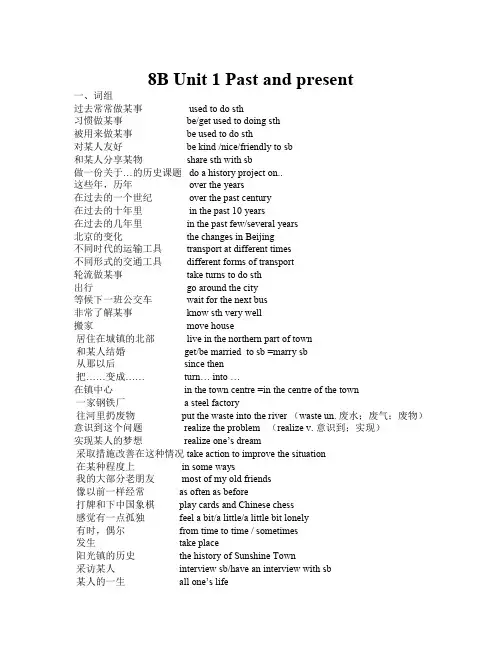
8B Unit 1 Past and present一、词组过去常常做某事 used to do sth习惯做某事 be/get used to doing sth被用来做某事 be used to do sth对某人友好 be kind /nice/friendly to sb和某人分享某物 share sth with sb做一份关于…的历史课题 do a history project on..这些年,历年 over the years在过去的一个世纪 over the past century在过去的十年里 in the past 10 years在过去的几年里 in the past few/several years北京的变化 the changes in Beijing不同时代的运输工具 transport at different times不同形式的交通工具 different forms of transport轮流做某事 take turns to do sth出行 go around the city等候下一班公交车 wait for the next bus非常了解某事 know sth very well搬家 move house居住在城镇的北部 live in the northern part of town和某人结婚 get/be married to sb =marry sb从那以后 since then把……变成…… turn… into …在镇中心 in the town centre =in the centre of the town一家钢铁厂 a steel factory往河里扔废物 put the waste into the river (waste un. 废水;废气;废物)意识到这个问题 realize the problem (realize v. 意识到;实现)实现某人的梦想realize one’s dream采取措施改善在这种情况 take action to improve the situation在某种程度上 in some ways我的大部分老朋友 most of my old friends像以前一样经常 as often as before打牌和下中国象棋 play cards and Chinese chess感觉有一点孤独 feel a bit/a little/a little bit lonely有时,偶尔 from time to time / sometimes发生 take place阳光镇的历史 the history of Sunshine Town采访某人 interview sb/have an interview with sb某人的一生all one’s life在过去 /在现在/在将来 in the past/at present/ in the future教许多关于中国的历史 teach a lot about the history of China学习更多关于北京的过去和现在learn more about Beijing’s past and present听说这部电影 hear about /of the film收到某人的来信 hear from sb计划做某事 plan to do sth居住环境,居住条件 living conditions干净又新鲜的空气 clean and fresh air从……返回 return from / come(go) back from回到…… return to/ come(go) back to出国 go abroad上小学 be at primary school和某人保持联系 keep in touch with sb主要通过电子邮件与某人交流 mainly communicate with sb by email让交流变得容易的多 make communication much easier玩乐的好去处 a good place to have fun穿过城镇的中心 run through the centre of the town很快适应生活的变化 get used to the changes of life quickly独自、独立on one’s own =by oneself=alone在一些大的空地上 in some large open spaces (space cn.空地 un.空间;太空)在两边 on both sides/on each/either side享受舒适的生活 enjoy a comfortable life搬到/搬进/搬出 move to /move into / move out of水/噪音/空气污染 water/noise/air pollution (pollution un.污染;污染物)乘汽车往返城镇 travel to and from the town听收音机 listen to the radio在他们的空余时间 in their free/spare time二、句型1. 后来政府意识到了这个问题并采取措施改善了情况。
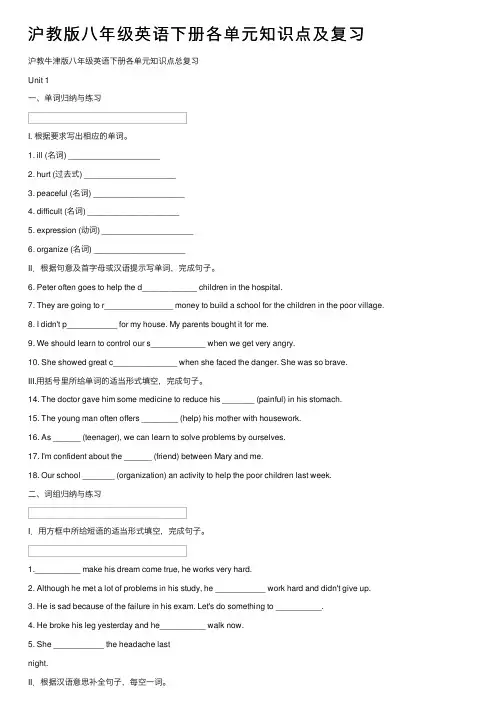
沪教版⼋年级英语下册各单元知识点及复习沪教⽜津版⼋年级英语下册各单元知识点总复习Unit 1⼀、单词归纳与练习I. 根据要求写出相应的单词。
1. ill (名词) ____________________2. hurt (过去式) ____________________3. peaceful (名词) ____________________4. difficult (名词) ____________________5. expression (动词) ____________________6. organize (名词) ____________________II.根据句意及⾸字母或汉语提⽰写单词,完成句⼦。
6. Peter often goes to help the d____________ children in the hospital.7. They are going to r_______________ money to build a school for the children in the poor village.8. I didn't p___________ for my house. My parents bought it for me.9. We should learn to control our s____________ when we get very angry.10. She showed great c______________ when she faced the danger. She was so brave.III.⽤括号⾥所给单词的适当形式填空,完成句⼦。
14. The doctor gave him some medicine to reduce his _______ (painful) in his stomach.15. The young man often offers ________ (help) his mother with housework.16. As ______ (teenager), we can learn to solve problems by ourselves.17. I'm confident about the ______ (friend) between Mary and me.18. Our school _______ (organization) an activity to help the poor children last week.⼆、词组归纳与练习I.⽤⽅框中所给短语的适当形式填空,完成句⼦。
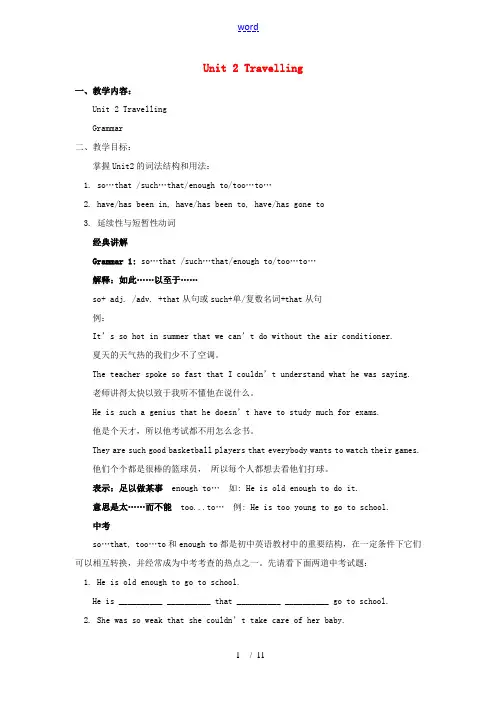
Unit 2 Travelling一、教学内容:Unit 2 TravellingGrammar二、教学目标:掌握Unit2的词法结构和用法:1. so…that /such…that/enough to/too…to…2. have/has been in, have/has been to, have/has gone to3. 延续性与短暂性动词经典讲解Grammar 1:so…that /such…that/enough to/too…to…解释:如此……以至于……so+ adj. /adv. +that从句或such+单/复数名词+that从句例:It’s so hot in summer that we can’t do without the air conditioner.夏天的天气热的我们少不了空调。
The teacher spoke so fast that I couldn’t understand what he was saying.老师讲得太快以致于我听不懂他在说什么。
He is such a genius that he doesn’t have to study much for exams.他是个天才,所以他考试都不用怎么念书。
They are such good basketball players that everybody wants to watch their games.他们个个都是很棒的篮球员,所以每个人都想去看他们打球。
表示:足以做某事enough to… 如: He is old enough to do it.意思是太……而不能too...to… 例: He is too young to go to school.中考so…that, too…to和enough to都是初中英语教材中的重要结构,在一定条件下它们可以相互转换,并经常成为中考考查的热点之一。
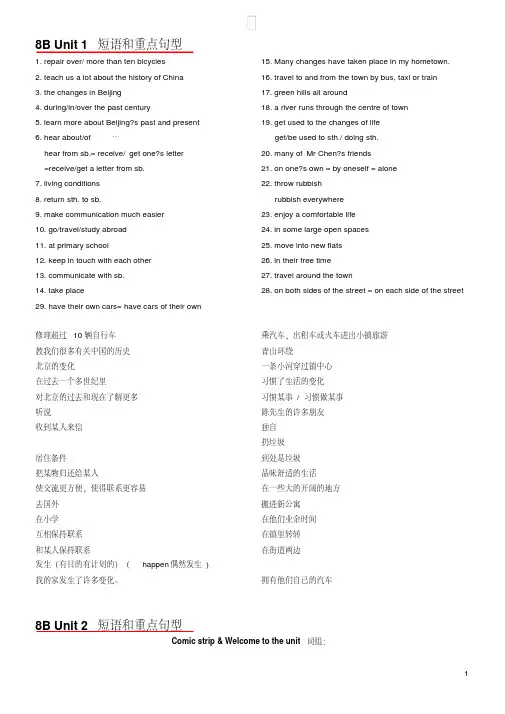
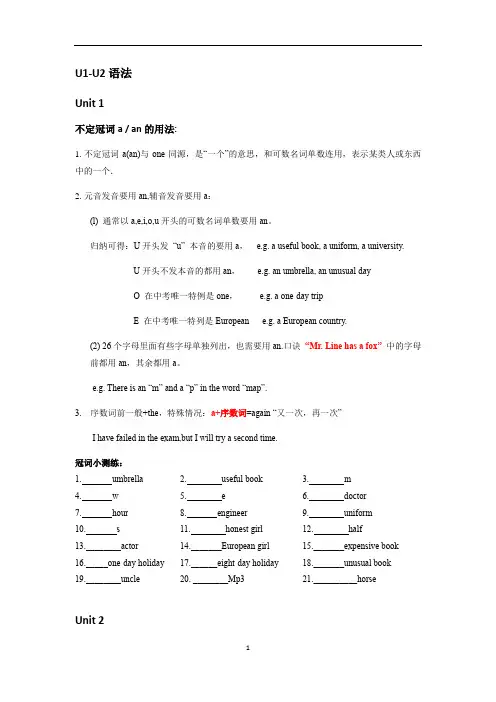
U1-U2语法Unit 1不定冠词a / an的用法:1.不定冠词a(an)与one同源,是“一个”的意思,和可数名词单数连用,表示某类人或东西中的一个.2.元音发音要用an,辅音发音要用a:(l) 通常以a,e,i,o,u开头的可数名词单数要用an。
归纳可得:U开头发“u” 本音的要用a, e.g. a useful book, a uniform, a university.U开头不发本音的都用an, e.g. an umbrella, an unusual dayO 在中考唯一特例是one, e.g. a one-day tripE 在中考唯一特列是European e.g. a European country.(2) 26个字母里面有些字母单独列出,也需要用an.口诀“Mr. Line has a fox” 中的字母前都用an,其余都用a。
e.g. There is an “m” and a “p” in the word “map”.3. 序数词前一般+the,特殊情况:a+序数词=again “又一次,再一次”I have failed in the exam,but I will try a second time.冠词小测练:1. umbrella2. useful book3. m4. w5. e6. doctor7. hour8. engineer 9. uniform10. s 11. honest girl 12. half13.________actor 14._______European girl 15._______expensive book 16._____one-day holiday 17.______eight-day holiday 18._______unusual book19.________uncle 20. ________Mp3 21.__________horseUnit 21. 八大时态的表达形式:2. 八大时态时间状语:一般现在时:always/often/ usually/sometimes/never ,every ,once a week ,on Sundays ,in themorning…一般过去时:yesterday, just now, last..., in 2008,...ago,the day before yesterday,this morning… 一般将来时:tomorrow, next day(…), soon, the day after tomorrow ,in+时间段.,in(the) future 等现在进行时:now, look, listen, at the moment, it’s+时刻,right now,at present,these days ,Bequiet!/Don't talk,at 7:30 in the morning(准确的现在时间)过去进行时:1) 时间点+过去时(at 8:00 yesterday )2)时间段+过去时(from 7 to 9 last night )3)at that time , the whole morning ,(at) this time yesterday...4)也有时没有时间状语,要通过上下文的暗示来确定用过去进行时。
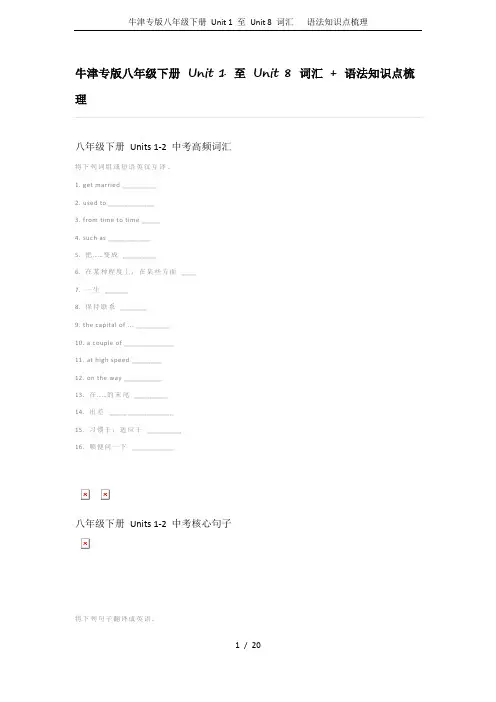
牛津专版八年级下册Unit 1 至Unit 8 词汇+ 语法知识点梳理八年级下册Units 1-2 中考高频词汇将下列词组或短语英汉互译。
1. get married _________2. used to ____________3. from time to time _____4. such as ___________5. 把……变成_________6. 在某种程度上;在某些方面____7. 一生______8. 保持联系_______9. the capital of ... _________10. a couple of _____________11. at high speed ________12. on the way __________13. 在……的末尾_________14. 出差_________________15. 习惯于;适应于_________16. 顺便问一下___________八年级下册Units 1-2 中考核心句子将下列句子翻译成英语。
1. 他过去经常去河里游泳。
___________________________________2. 我已经习惯了在这里生活。
___________________________________3. 我哥哥不在家,他去图书馆了。
___________________________________4. 他们离开上海一年了。
___________________________________5. 我保证你会喜欢我的礼物的。
___________________________________八年级下册Units 1-2 中考核心语法考点一:现在完成时的基本用法现在完成时表示从过去持续到现在的动作或状态,或已完成但对现在有一定影响的动作。
它的结构是“主语+have / has+ 动词过去分词+其他”。
常和already、ever、just、never、recently、yet 等副词以及since 和for 引导的时间状语连用。
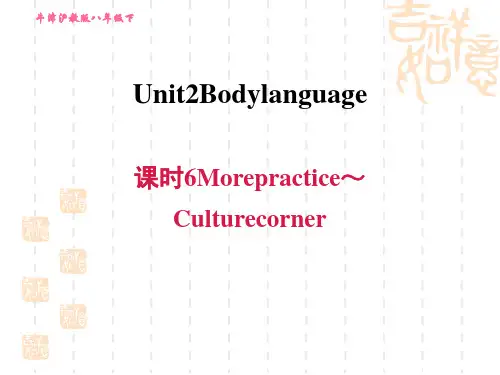
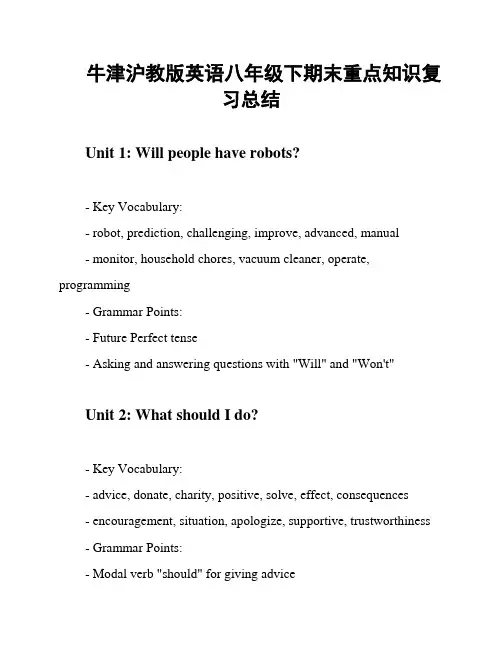
牛津沪教版英语八年级下期末重点知识复习总结Unit 1: Will people have robots?- Key Vocabulary:- robot, prediction, challenging, improve, advanced, manual- monitor, household chores, vacuum cleaner, operate, programming- Grammar Points:- Future Perfect tense- Asking and answering questions with "Will" and "Won't"Unit 2: What should I do?- Key Vocabulary:- advice, donate, charity, positive, solve, effect, consequences- encouragement, situation, apologize, supportive, trustworthiness - Grammar Points:- Modal verb "should" for giving advice- Making suggestions with "Why don't...?" and "How about...?"Unit 3: Teenagers should be allowed to choose their own clothes- Key Vocabulary:- strict, argue, fashion, freedom, express, individuality, reasonable - uniform, appropriate, dress code, personal, decision, opinion- Grammar Points:- Expressing permission and prohibition with "should be allowed to" and "should not be allowed to"- Giving reasons using "because"Unit 4: Our world in the future- Key Vocabulary:- environment, pollution, population, renewable, energy- resources, global warming, greenhouse effect- Grammar Points:- Expressing future time using "will" and "going to"- Talking about future plans and predictionsUnit 5: Let's celebrate!- Key Vocabulary:- tradition, custom, celebrate, festival, occasion, gather- lantern, reunion, special, fireworks, delicious, fortune- Grammar Points:- Present continuous tense- Talking about future plans and arrangements using "going to" Unit 6: What are you doing to help others?- Key Vocabulary:- fund, support, organize, event, poverty, education- Grammar Points:- Present continuous tense for actions happening now- Asking and answering questions with "What" and "Where" Unit 7: What's in the news?- Key Vocabulary:- headline, article, journalist, report, interview- current, event, opinion, headline, broadcast, press- Grammar Points:- Using question words to ask about specific information- Present continuous and simple present tenses to describe news eventsUnit 8: How was your school trip?- Key Vocabulary:- adventure, trip, impressive, exciting, thrilling- fascinating, breathtaking, enjoyable, memorable, view- Grammar Points:- Describing events and experiences using adjectivesUnit 9: Our world heritage- Key Vocabulary:- heritage, monument, architecture, treasure, valuable- ancient, historical, preserve, protect, cultural, site- Grammar Points:- Past continuous tense for actions in progress in the past- Talking about past events and experiencesUnit 10: Life in the future- Key Vocabulary:- virtual reality, invention, gadget, access, revolution- Grammar Points:- Using "will" and "won't" for future predictions- Talking about future possibilities and changes以上是对牛津沪教版英语八年级下册期末考的重点知识进行的简要总结。
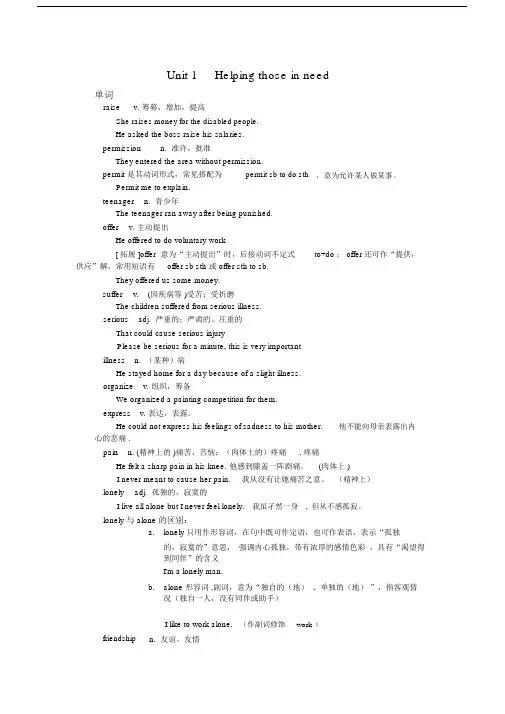
Unit 1Helping those in need单词raise v. 筹募,增加,提高She raises money for the disabled people.He asked the boss raise his salaries.permission n. 准许,批准They entered the area without permission.permit 是其动词形式,常见搭配为permit sb to do sth,意为允许某人做某事。
Permit me to explain.teenager n. 青少年The teenager ran away after being punished.offer v. 主动提出He offered to do voluntary work[ 拓展 ]offer 意为“主动提出”时,后接动词不定式to+do ; offer 还可作“提供,供应”解,常用短语有offer sb sth 或 offer sth to sb.They offered us some money.suffer v. (因疾病等 )受苦;受折磨The children suffered from serious illness.serious adj. 严重的;严肃的、庄重的That could cause serious injuryPlease be serious for a minute, this is very importantillness n. (某种)病He stayed home for a day because of a slight illness.organize v. 组织,筹备We organized a painting competition for them.express v. 表达,表露。
He could not express his feelings of sadness to his mother.他不能向母亲表露出内心的悲痛 .pain n. (精神上的 )痛苦,苦恼;(肉体上的)疼痛, 疼痛He felt a sharp pain in his knee. 他感到膝盖一阵剧痛。

牛津专版八年级下册Unit 1 至Unit 8 词汇+ 语法知识点梳理八年级下册Units 1-2 中考高频词汇将下列词组或短语英汉互译。
1. get married _________2. used to ____________3. from time to time _____4. such as ___________5. 把……变成_________6. 在某种程度上;在某些方面____7. 一生______8. 保持联系_______9. the capital of ... _________10. a couple of _____________11. at high speed ________12. on the way __________13. 在……的末尾_________14. 出差_________________15. 习惯于;适应于_________16. 顺便问一下___________八年级下册Units 1-2 中考核心句子将下列句子翻译成英语。
1. 他过去经常去河里游泳。
___________________________________2. 我已经习惯了在这里生活。
___________________________________3. 我哥哥不在家,他去图书馆了。
___________________________________4. 他们离开上海一年了。
___________________________________5. 我保证你会喜欢我的礼物的。
___________________________________八年级下册Units 1-2 中考核心语法考点一:现在完成时的基本用法现在完成时表示从过去持续到现在的动作或状态,或已完成但对现在有一定影响的动作。
它的结构是“主语+have / has+ 动词过去分词+其他”。
常和already、ever、just、never、recently、yet 等副词以及since 和for 引导的时间状语连用。
沪教牛津版初二下册英语知识点总结全册含习题和答案本文档为初二下册英语知识点总结,旨在帮助学生巩固所学的知识。
以下是全册的知识点总结和题及答案。
单元一:School Life- 主要知识点:学校设施、学校日常活动- 题:1. What facilities does your school have?(答案根据实际情况)2. Describe a typical school day.(答案根据个人经历)单元二:Family Time- 主要知识点:家庭成员、家庭活动- 题:1. How many people are there in your family?(答案根据实际情况)2. Describe a family activity that you enjoy.(答案根据个人经历)单元三:Hobbies and Interests- 主要知识点:爱好和兴趣、表达喜欢与不喜欢- 题:1. What is your favorite hobby? Why?(个人回答)2. List three things you like and three things you don't like.(个人回答)单元四:Healthy Living- 主要知识点:健康生活方式、饮食和运动- 题:1. What do you do to stay healthy?(个人回答)2. Describe a healthy meal.(个人回答)单元五:Travel and Adventure- 主要知识点:旅行和冒险、地理和文化知识- 题:1. Describe a place you would like to visit and why.(个人回答)2. What is a famous landmark in your country?(个人回答)单元六:Technology and Innovation- 主要知识点:科技和创新、数字产品和服务- 题:1. How has technology changed your life?(个人回答)2. What is your favorite digital device or service?(个人回答)- 主要知识点:语言和交流、不同国家和文化的语言- 题:1. How many languages can you speak?(个人回答)2. List three words in a language other than English.(个人回答)单元八:Entertainment and Media- 主要知识点:娱乐和媒体、影视作品和音乐- 题:1. What is your favorite movie or TV show? Why?(个人回答)2. Describe a song or piece of music you like.(个人回答)以上是沪教牛津版初二下册英语的知识点总结和题及答案。
Unit2语法,知识点,写作背默语法精讲现在完成时(二)1.have/has gone to和have/has been to的用法。
(1)have/has gone to意为“到某地去”,说话时该人不在现场,一般不用第一、二人称作句子的主语。
例如:—Where is Jim?吉姆在哪里?—He England.他去英国了。
(尚未回来)(2)have/has been to意为“曾经去过某地”,现在已不在那里了,后可接次数,如once,twice,three times等,表示“去过某地几次”,也可和just,never,ever等连用。
例如:My father Beijing twice.我父亲去过北京两次。
此外,have/has been in表示“在某地待了多长时间”,常与表示时间段的状语连用。
例如:I Shanghai for three years.我到上海已有三年了。
2.延续性动词和非延续性动词。
动词按动作发生过程的长短, 分为延续性动词和非延续性动词1. 延续性动词的用法:延续性动词表示的动词是一种可以延续一段时间的动作。
如:learn, work, stand, know, walk, keep, have, wait, watch, sing, read, sleep, live 等。
这一类动词常与表示一段时间的时间词连用。
e.g. 我学习英语已经8 年了。
I English for eight years.2. 非延续性动词的用法非延续性动词表示的动作不能延续, 即动作发生立即结束。
如:leave, start, set out, arrive, reach, get to, begin, stop, shut, turn off, marry, put, put on, get up, wake, fall, join, finish, end, become, come, go, die, close, open, break, give, jump, buy, borrow 等。
⽜津译林版⼋年级英语全册语法知识点总结8A语法Unit 1 Friends形容词⽐较级和最⾼级的变化规则1.规则变化:(1)⼀般形容词+er +est (shorter, smaller, smallest )(2)以e 结尾的形容词+r +st (nicer, larger, largest)(3)以辅⾳字母加y 结尾的形容词变y 为i 再+er, est (busier, busiest; heavier, heaviest)(4)以重读闭⾳节结尾的形容词双写辅⾳字母+er, est 熟记:⼤(big)热(hot)天,⼀个穿红(red)⾐浑⾝湿(wet)透的伤感(sad)胖(fat)⼦想要变得⼜瘦(thin)⼜苗条(slim)2.不规则变化(1)good(well)-better-best(2) many(much)-more-most(3)ill(bad, badly)-worse-worst(4) far-farther (further)-farthest (furthest)(5) little-less-least(6) few-fewer-fewest3.多⾳节的形容词⽐较级和最⾼级在词前加more , mostdelicious-more delicious-the most delicious popular-more popular-the most popular注意: 1 形容词的最⾼级前必须有the, ⽽副词的最⾼级前the 可省略2.⽐较级前常⽤a bit, a little, much, a lot, even, far 等词表⽰程度.3.形容词⽐较级⽤来⽐较两者(⼈或事)句中常有than; 形容词最⾼级⽤来⽐较三者或三者以上(⼈或事), 句中常有in 或of 短语表⽰⽐较范围.4. as+adj.+as (和------⼀样------) / not as/so +adj.+ as (不如------,不及------)Unit 2 School life⼀、⽐较事物的数量1.many (修饰可数名词)/much (修饰不可数名词)----more ----mostmore + 可数名词复数/ 不可数名词+ than ……⽐……数量多e.g. I have more friends than you.2.few (修饰可数名词) ----fewer----fewestlittle (修饰不可数名词)----less----leastfewer +可数名词复数+ than ……⽐……数量少e.g. There are fewer boys than girls in our class.less + 不可数名词+than ……⽐……数量少e.g. I spend less money on food than my sister.3.the fewest +可数名词复数在……中最少He has the fewest books.4.the least +不可数名词在……中最少She has the least money of us.5.the most + 可数名词复数/ 不可数名词最多Daniel has the most money.⼆、副词的⽐较级和最⾼级(构成⽅法及⽤法与形容词基本相同)1.⼀般在词尾直接加er或est,例如,hard-harder-hardest fast-faster-fastest loud-louder-loudest2、部分双⾳节词和多⾳节词分别在原级前加more构成⽐较级和most构成最⾼级,例如:slowly-more slowly-most slowly clearly-more clearly-most clearlycarefully-more carefully-most carefully3、副词⽐较级和最⾼级的不规则变化well-better-best badly-worse-worstfar-farther/further-farthest/furthestUnit 3 A day out⼀、as…as的⽤法表⽰A与B在某⼀⽅⾯程度相同或不同时⽤形容词/副词原级。
上海牛津版八年级下学期英语词组知识点梳理Unit1beinterestedin biggestandoldest livingthings makestreetsmorebeautifulandl essnoisyontheendofcomefromsuppose enjoybreathingpure,coolair thank…fortake…fromharmfulgasesrelease…into produceenoughoxygen keep…aliveandhealthy cooltheairaswellas naturalairconditionersrun dothejobof knowalotaboutsth attackatreewarn protectthemselvesbydoingsth join…togetherpass…to communicatewithoneanother beindangercutdownreplacehardlydestroyexchangenaturemainUnit2pour…intovanishdownthedrainturn…offlookaroundsoundimpatient/puzzledIt’snoteasyformetogethere. comfortablycarry…torelaxtravelalongway Itwastimetogetcleanedup. give...athoroughcleaning add…towait…until theendofthejourney remembernottodosth precious Whatdoyoumeanbydoingsth noreplaycomeoutoftorestordinarymanufactureequipmentUnit3servant apacketofsthtricklookfoolish flowthroughawiremeasuretheamountofmonthlyinawayexplanation muchmoredangerous becarefulwith Canyoutellmewhatitlookslike Beinvisiblechange…into differentformsofenergy comeintoourflat beconnected tocall…sthpolitelycontainproduceswitchofflockencouragebehavepolitecustomerUnit4holdameeting/beatthemeeting decidetodosththechiefeditor suggestthatsb(should)dosth voteforelectsb.tobetakechargeofoughttodosth askforsuggestion haveexperience besecretaryoftakenotestheotherthree beresponsiblefortalk…overamongmakealistofsth publishthepaper befreetopayforsth considerbriefly askwhether…haveanidea thinkabout…abitlonger makeadecisionabout agreetodosth conclude arrangetodosth inoneweek’stime agreeoninalltalentgatherdelightedshamedesigncomplainUnit5belongtoassoonas walkintosomeplace bookaroomYou’rewelcome.allowsoundlike…interruptatoncebothleadsb. Personallyto…beforedoingsth thelocationofthefire exitsafety describesthtosb inoneownwords beasleepsmellsmokegooffmustbeoutside thephonewasdeadalonglayonthefloorbesideseemlikemomentslater/secondslater besafesaveone’slifelendtakecaremindlookoutwatchoutUnit61.nowthat:since2.bebehindsb3.thinkaboutdoingsth.4.goabroad国外/aboard5.whynotdosth/Whydon’tsb.dosth.6.spreadone’swings7.oneofthemostpopulartourist destinations8.suchas/foreexample9.wide,tree-linedstreets10.thesamesizeas/asbigas11.attractions/attractive12.anhourawayfrom/howfar13.thecenterofParis14.offertodosth.15.goontodosth./goondoingsth .16.doitwithoutdoingsth17.enable…to/beabletodosth./ability(n. )18.travel…from…to…19.growcrops20.make+adj./makesb.dosth21.excellent:verygoodedtodosth.过去常常做某事/beusedtodoing习惯于做某23.befamousfor 24.theinfluenceof./haveaninf luenceon25.insomeway26.providesb.for sth./providesth.forsb.27.aleaderinartandculture(le d-leading)28.alotofyoungstudentsfromdifferentcountriesgotoFrance29.tofurtherone’sstudy(why)30.filmfestivals,exhibitions andconcerts31.throughouttheworld/allove rtheworldUnit71.beathome/beatwork2.aboringman/makemebored3.onthesite4.walkonanarrowplank5.scared/scary6.onone’sown:byoneself7.bepleasedwith(pleasing,ple asure,pleasant)8.becross/angry9.payattentionto10.scoldsb11.putsbindetentio n12.helpsbineveryway13.lovechattingwithsb(talkwi th)14.bepuzzledbysth(puzzling)15.Pretendtodosth.16.concernabout17.accept-acceptable18.express-expression19.honest-honesty-dishonest20.patient-patience-impatien t-patiently-impatiently。
Unit 1 Helping those in need阅读:读三名学生关于他们的志愿服务工作(voluntary work义务性工作)的报告。
听力:听一个关于筹钱活动的广播节目。
语法:学习如何使用不定式。
口语:学习谈论计划。
谈论你想参加的志愿活动。
写作:给校长写一封信,报请批准筹钱。
A. 短语归纳1. in need 需要帮助的2. voluntary work 志愿服务工作3. talk about 谈论4. write a letter to sb. 给某人写信5. ask permission 报请批准6. give sb. a hand 帮助某人7. suffer from 因…受苦;受折磨8. take photos of: 给…拍照9. lots of/a lot of 许多,大量10. raise one' s spirts 使振奋;使鼓起勇气11. in the future 在将来12. in good health 身体健康13. in bad health 身体不好14. be afraid of 害怕15.so that 以便,为了16. in hospital 生病住院17. make friends with sb. 跟某人交朋友18. bring sth.to sb. 将某物带给某人19. play tennis 打网球20. on Saturday 在周六21. in order to 目的在于,为了22. because of 因为23. since then 从那时起24. pay for 支付25. stay at home 待在家里26. help sb. with sth. 在某方面帮助某人27. close to 靠近28. listen for 留心听29. talk to 和……交谈30. use...for. 把…用于……31. give sb. some advice 给某人一些建议32. take part in 参加33. millions ofa 数以百万计的B. 句型归纳1. would like to do sth. 想要做某事2. teach sb. to do sth. 教某人做某事3. offer to do sth. 主动提出做某事4. want to do sth. 想做某事5. help sb.(to) do sth. 帮助某人做某事6. continue to do sth. 继续做某事7. have difficulty(in) doing sth. 做某事有困难8. need to do sth. 需要做某事9. enjoy doing sth. 喜欢做某事10. used to do sth, 过去常常做某事11. how much+ 不可数名词多少12. decide to do sth. 决定做某事13. begin to do sth. 开始做某事14. like to do sth. 喜欢做某事15. forget to do sth. 忘记要做某事16. plan to do sth. 计划做某事17. think about doing sth. 考虑做某事18. one of+ 复数名词/代词……之ー19. be unable to do sth. 不能做某事20. learn to do sth. 学习做某事21. wish to do sth. 希望做某事22. hope to do sth. 希望做某事23. make+sb./sth.+ 形容词使某人/某物…24. Thanks for( doing)sh. 因(做)某事而感谢。
Unit 1 Past and present重点短语1.过去常常做某事used to do sth. 15. 了解更多关于某事learn more about sth.2.谈论不同时代的交通工具talk about transport at different times 16. 去国外go abroad3.对...很了解know a lot about...=know... very well 17. 计划再看它一次plan to see it again4.搬家move house 18. 绕城镇旅行travel around the town5.A和B结婚A get married to B=A and B get married6.主要通过电子邮件交流mainly communicate by email7.把... 变成... turn... into... 19. 青山环绕green hills all around8.将废弃物倒入河流put the waste into the river 20. 习惯于做某事be/get used to (doing) sth.9.感到有点孤单feel a bit/ a little lonely 21. 独自做某事do sth. On one’s own/by oneself10.不时,有时,偶尔from time to time 22. 在开阔的空地上in open spaces11.采访某人interview sb. = have an interview with sb.12.在他们的空余时间听收音机linsten to the radio in their free time13.告诉某人关于某事tell sb. about sth. 23. 享受着舒适的生活enjoy a comfortable life14.在某种程度上in some ways重点句型1.你过去常常和我一起分享食物。
A .don't make B. not make C. not making D .not to make8. An army spokesman stressed that all the soldiers had been ordered _____clear warnings before firing any shots.A .to issue B. being issued C. to have issued D. to be issued9. I'd rather have a room of my own, however small it is, than_______ a room with someone else.A. to shareB. to have sharedC. shareD. sharing10. The bank is reported in the local newspaper_________ in broad daylight yesterday.A. robbedB. to have been robbedC. being robbedD. having been robbed11. A number of paintings in the castle are believed ________in a fire.A. being destroyedB. having been destroyedC. to be destroyedD. to have been destroyed12. The meeting _______ next week is sure to be a great success.A. to take placeB. to be taken placeC. to have taken placeD. being taken place13. As a result of my laziness, I failed ________ my work in time.A. and finishedB. to finishC. and finishingD. to finished14. I am sorry ______ written you a letter at the time.A. to have notB. to not haveC. not to haveD. not having15. Will you lend him a magazine _________?A. to be readB. for readingC. to readD. he read16. He could do nothing but _______for the bus _________.A. wait, to comeB. wait; comeC. waiting; comingD. waited; came17 .It is a problem that doesn't need ________ right now.A. to solveB. solvingC. being solvedD. to be solving18. There's a man at the reception desk who seems very angry and I think he means _______ trouble.A. makingB. to makeC. to have madeD. having made19. I remember _______him _______the bike needed __________.A. hearing, saying, to repairB. to hear, say, to repairC. hearing, say, repairingD. to hear, saying, to be repaired20. --- You should have thanked her before you left.--- I meant _________, but when I was leaving I couldn't find her anywhere.A. to doB. toC. doingD. doing so21. Robert is said to __________ abroad, but I don't know what country he studied in.A. to have studiedB. to study B. to be studying D. to have been studying22. I'm gong to Xi'an next week. Have you anything __________ to your parents?A. to takeB. to be takenC. to be bought toD. to buy23. when are they __________ in their plan?A. handB. handedC. to handD. give24. In such dry weather, the flowers will have to be watered if they _____________.A. have survivedB. are to surviveC. would survivedD. will survive25. When we hurried to the station, there happened ________ no bus at that time.A. to haveB. to beC. havingD. being26. I lost my way in complete darkness and, _________ matters worse, it began to rain.A. madeB. having madeC. makingD. to make27. At ________ time does the salesgirl get up late in the morning, though she is always too busy _________a good rest.A. no, to takeB. no, takingC. any, to takeD. one, taking28. --Are you a student? --No, but I used _________.A. to beB. to wasC. to doD. to be a29. I stopped to listen, and my son seemed _________ himself _________ in the living room.A. to enjoy, to shutB. to be enjoying, shuttingC. to be enjoying, shutD. to have enjoyed, having shut30. With a lot of difficult problems _________, the newly-elected president is having a hard time.A. settledB. settlingC. to settleD. being settled31. We're leaving at six o'clock, and hope _________ most of the journey by lunch time.A. to doB. to have doneC. to makeD. to have made32. The study of the wild world may help to make the world easier _________.A. understoodB. to be understoodC. to understandD. understand33. Who will you get __________ the project for us?A. designB. to designC. designedD. designing34. It is said in Australia there is more land than the government know __________.A. it what to do withB. what to do it withC. what to do with itD. to do what with it35. We are not allowed __________ outdoors with some other children.A. playingB. to be playingC. to playD. be playing36. Allen had to call a taxi because the box was _________ to carry all the way home.A. much too heavyB. too much heavyC. heavy too muchD. too heavy much37. She feels so strongly that each of us should have a role __________in making the earth a better place to live in.A. to have playedB. to playC. to be playedD. to be playing38. When I handed the report to John, he said that George was the person _________.A. to sendB. for sending itC. to send it toD. for sending it to39. Do let your mother know all the truth, she appears _________ everything.A. to tellB. to be toldC. to be tellingD. to have been told11 / 11。